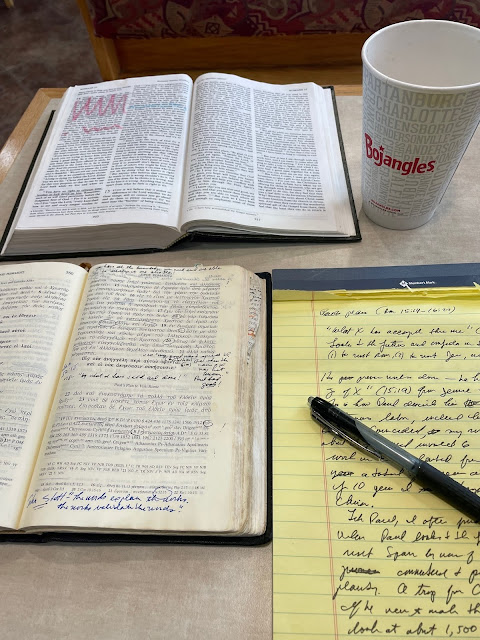In my Bible time today I read two chapters that I think are fantastically beautiful. The passage is Romans 15-16.
It was as though God was speaking directly to me. Here Paul is discussing his future travel plans. Remember, he is writing to the Romans from the city of Corinth at the end of his third missionary journey. And he is certain about one thing -- that his previous work is done. He has "fully preached the gospel of Christ" (15:19). Imagine that! This is how Paul describes 10 years of strenuous labor, including all 3 of his missionary journeys. I thought to myself, "What a coincidence." You see, my work in South Korea lasted 10 years and involved 6 trips. Then my work in Ethiopia lasted from 2004 to 2013 -- a total of 9 years and 17 trips. Finally, for 10 years I made 13 trips to serve in China.
Here Paul is asking out loud, "What's next?" Like a recent retiree, he sees the future as a time to revive dreams deferred from years ago. A new passion surely looms ahead (so we retirees always tell ourselves). Isn't it time for that dream trip or audacious endeavor? When Paul looks to the future, he tells us that he is determined to visit Spain by way of Rome, thus continuing his commitment to pioneer evangelism and church planting. Now, a trip from Corinth to Spain via Rome is about 1,500 miles by ship. But if we add an intermediate visit to Jerusalem, the total becomes more like 3,000 miles. Paul has longed for many years to visit Rome and from there to be sent on his way to Spain with the backing of the Roman believers. But first, he says, he has to go to Jerusalem? Has to? Why? Why add 1,500 miles to your itinerary just to be able to present some money to the saints in Jerusalem? Surely others could undertake such a simple task for him. But no, says Paul. Clearly he sees great significance in presenting the offering personally. He knew better than anyone else that Gentile converts owed a huge debt to the Jews and therefore, as the "apostle to the Gentiles," he will go up to Jerusalem in person and present the offering from the Gentile churches as a material symbol of this indebtedness.
So that's the plan. No going back on it. It might not seem like much -- dropping off some money -- but Paul saw God in it and so he had no choice but to obey his leading.
What's next for me? I often wonder. At the age of 70, do I still have something to offer the Lord? And then I remember what Elijah said to the widow of Zarephath: "Make me a cake." It was as if Elijah was saying to her, "Yes, I know you are destitute. Yet there is still something you can do. From your poverty, you can give me something I need. It might not seem like much to you, but if you will give it to me, I can do something with it that I could not do otherwise."
Believe it or not (yet another coincidence with Paul's ministry!), it appears that one of the next international trips I will make is back to Israel. You see, my beginning Greek grammar is being translated into Modern Israeli Hebrew. There are only 2 chapters left to go. Once it is published, I am told it will be the first of its kind. The plan is for me to fly to Israel for the book's release and take a couple of weeks giving lectures in the universities there. I honestly never expected any of this to happen. "Lord," I ask myself, "is this the little 'cake' you need from me? If so, I will gladly bake it for you." And you know what? Taking the new step, baking the new cake, is infinitely less frightening than facing years of hesitation and ambivalence. It is to feel new shoes on your feet as you ascend toward the next peak in the journey up the mountain. Like Paul, I am discovering the courage to take new steps that allow me to let go of each previous stage with its satisfactions and to find fresh responsibilities that will lead to the richness of the next.
Dostoevsky once said, "Taking new steps, uttering a new word, is what people fear most." What we should fear is the exact opposite.
